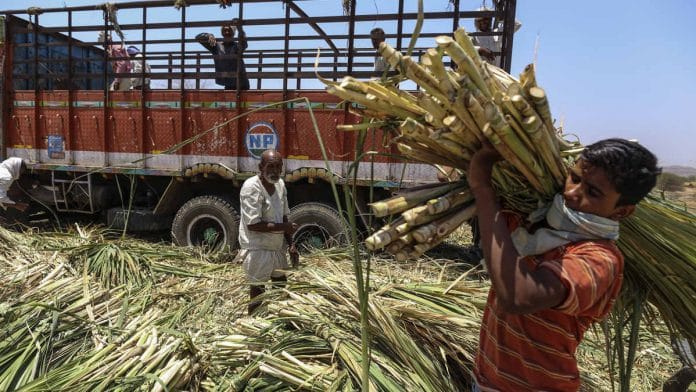Recent protests sparked by sugar mills’ move to pay farmers at a rate of Rs 2,300 per tonne while the FRP is Rs 2,850 per tonne.
Mumbai: Violent protests against sugar mill owners by sugarcane farmers in western Maharashtra over a delay and only partial payment of their dues were suspended late Monday after negotiations with the sugar mills.
Farmers have agreed to give sugar mill owners time till 28 January to arrange funds for making full payment of dues to sugarcane growers in the region.
The move comes after the protests where farmers in Sangli, Satara, Solapur and Kolhapur stopped harvesting and transportation of sugarcane. Some farmers even torched offices of sugar mills and forcibly shut their field offices last week.
What’s the price issue?
Farmers say sugar mills usually pay the Fair and Remunerative Price (FRP) in full to farmers within 14 days of the sugarcane being taken for crushing. However, this time, within two months of the crushing season, till 31 December 2018, sugar mills owed arrears of Rs 4,575.53 crore to sugarcane farmers, as per data from Maharashtra government’s sugar commissioner’s office. The total FRP due to the farmers is Rs 7,450.9 crore.
The recent protests have been sparked by sugar mills’ decision to pay farmers at a rate of Rs 2,300 for every tonne of cane crushed, even as the FRP is Rs 2,850 per tonne.
Angry farmers have threatened to prevent Bharatiya Janata Party (BJP) president Amit Shah from visiting Kolhapur on 24 January if their grievances are not addressed.
The protests could have political implications for the Lok Sabha and state elections later this year.
Why has it come to pass?
Sugar factories are hamstrung by a glut in sugar production, falling prices of sugar in the domestic market as well as a slow pace of exports. Mill owners say the current selling price of sugar is not enough to recover the cost of production. They have expressed their inability to pay the FRP, in full, in one installment.
This is unacceptable to most farmers.
Also read: Financial distress driving farmer suicide, mass revolt likely: Sharad Pawar tells Modi
Politics of sugarcane
The politics in the sugar belt of western Maharashtra have added fuel to the conflict.
Raju Shetti, a Swabhimani Paksha MP, has taken the lead in the sugarcane farmers’ protests. Shetti left the National Democratic Alliance in August 2017, saying the government had done little to curb farmers’ distress.
A large number of sugar mills in western Maharashtra are controlled by leaders of the opposition Congress and Nationalist Congress Party (NCP). The two parties are in talks with Shetti to include his party in their alliance.
NCP chief Sharad Pawar has demanded that the state government give a Rs 500-crore relief package to sugar mills so that they can clear the FRP. Meanwhile, mill owners demanded a Rs 500-per tonne price at a meeting with Maharashtra Chief Minister Devendra Fadnavis last week.
What have state & central governments done so far?
The BJP-led governments at the state and Centre, however, have done little to douse the ongoing protests.
Fadnavis has said that he has requested the Union government to increase the minimum ex-mill sale price of sugar from Rs 29 kg to Rs 31 per kg but nothing has been done.
Speaking in Solapur district last week, Union Minister Nitin Gadkari attributed the current crisis to global factors. He said the solution is to move away from sugar production and turn to production of ethanol instead.
Also read: Modi govt to announce income support scheme for farmers before Union Budget







More than moving from sugar to ethanol, the long term solution is to move from cultivation of sugarcane to other crops.